Australia So Much to See
Copyright (C) 2013 AustraliaSoMuchtoSee.com. All reights reserved
Sources used for identification of wildflowers shown on these pages and regions where they occur see Credits
These pages will
feature some of the wildflowers I have photographed in Western Australia, and where possible, identified. If you are able
to help identify further flowers, or correct any I may have wrong, please
contact us.
Information given for each species will
give botanical name, known common names, describe the flower, give time of year it was seen, and where it was photographed, and the
areas it occurs in. Names have been matched to Florabase which has also been used to show distribution.
See some of
these wildflower in larger sized photos on our Flickr pages.
Pyrorchis nigricans 1994 (formerly Lyperanthus nigricans) Red Beaks, Redbeak orchid, Red Fire Orchid, Fire Orchid, Elephants Ears
(referring to the fleshy flat leaf on the ground that produces the flowers).
Red and white orchid, several flowers along upright stem
which comes from one flat leaf on the ground. A frilly red and white labellum (tongue) with tip curled under is hidden under
the beak (top petal curves forward with a long point to form this covering beak). Flowers turn black when flowering finishes.
Late
Winter
Bridgetown, South West Region, Western Australia and through the Mid West, Perth South West and Great Southern regions and the
coastline from Shark Bay to Esperance. These grow on a variety of soil types.
Grievea brachytropis (formerly Pultenaea brachytropis )
Loricobbia ochreata (formerly Pultenaea ochreata)
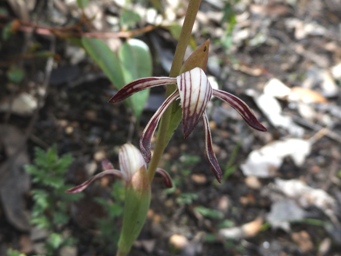
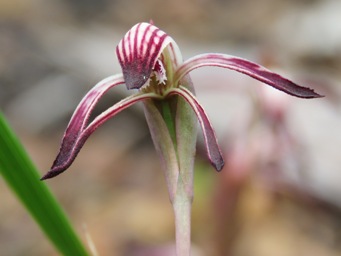
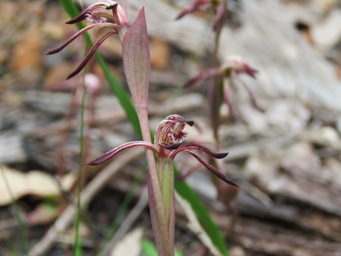
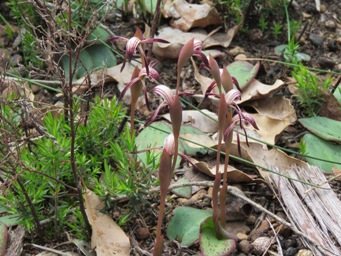
Leaves, or Elephant's Ears are pointed, often spotted, and usually have a red edge. Underside has longitudinal stripes. Sizes
vary. These can be prolific each year across the forest floor, although very few flower. Following a hot summer fire there
may be areas of large numbers flowering, thence the common name Fire Orchid.
Jennata radiata, (formerly Pultenaea radiata)
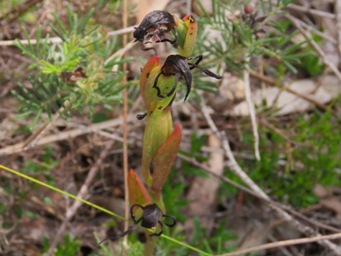
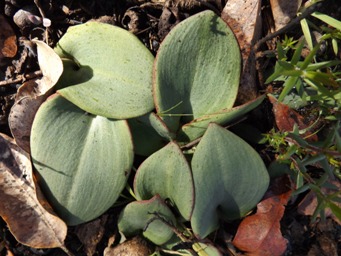
Pultenaea genus was mostly distributed to other and new genera in 2024.

Pyrorchis forrestii 1994 (formerly Lyperanthus forrestii) Pink Beaks, Pink Fire Orchid.
A pink orchid, with one to three flowers along
upright stem which comes from one flat leaf on the ground. A frilly pink labellum with red striping is partially covered by
the top petal curling forward. Leaf is flat on the ground, broad and pointed, with faint spots and a pale tan edging. Underside has longitudinal stripes.
Foliage only seen in November, usually flower in November December, often as
a response to fire.
Yornup, southern Bridgetown-Greenbushes Shire, South West region, Western Australia, close to the Manjimup
Shire. Occur near to the coast between Augusta and Albany, reaching inland as far as Manjimup. Favouring peaty soils,
sandy clay, swamps, creeklines and adjacent areas.






